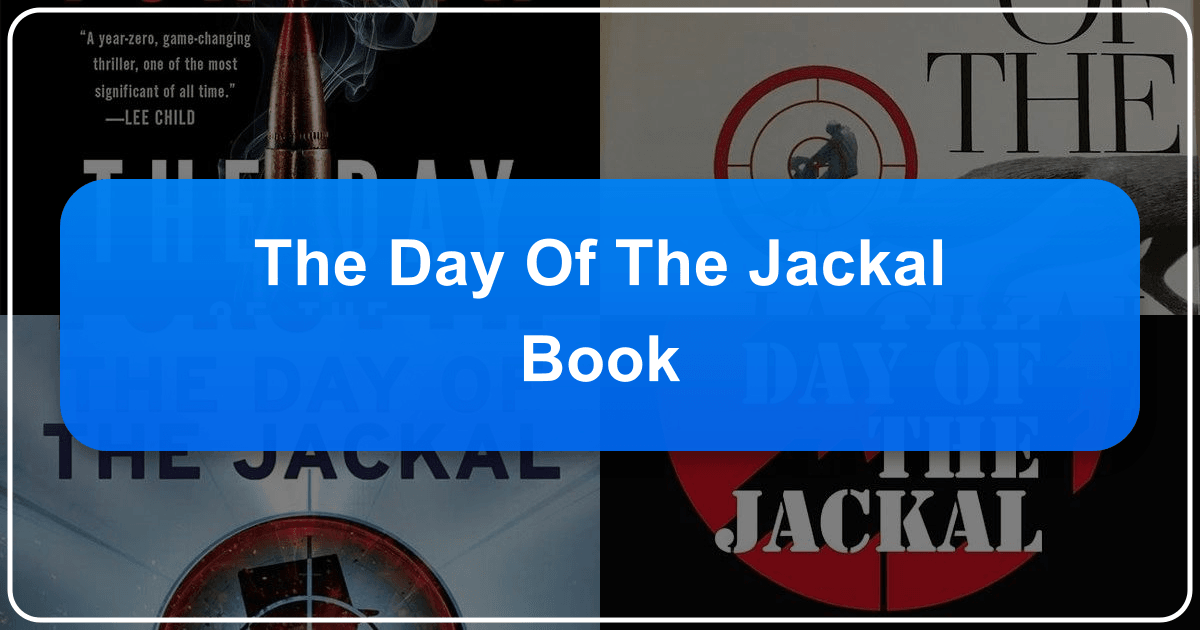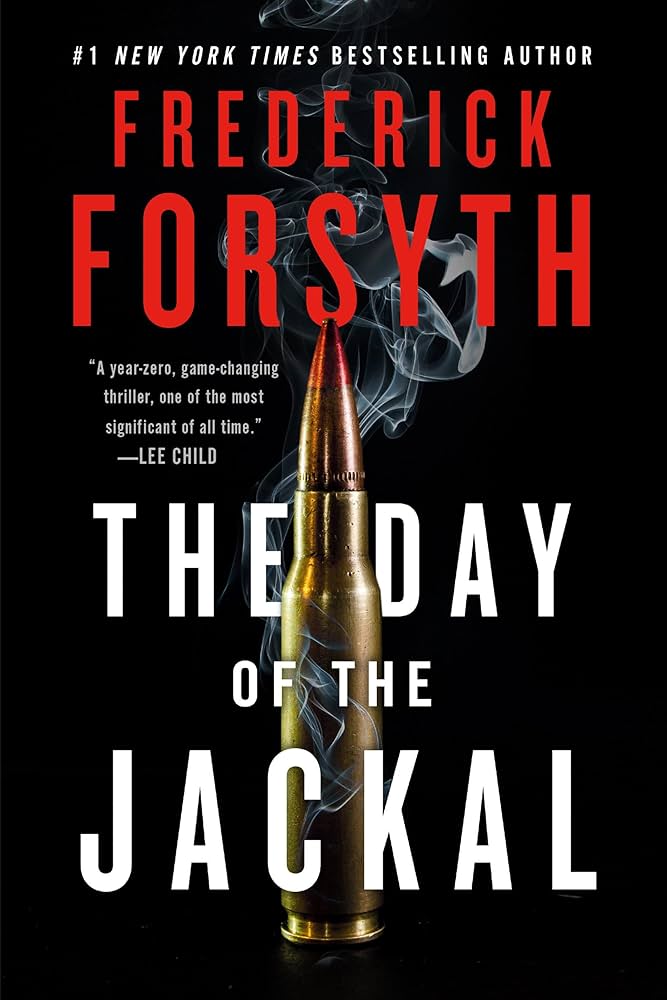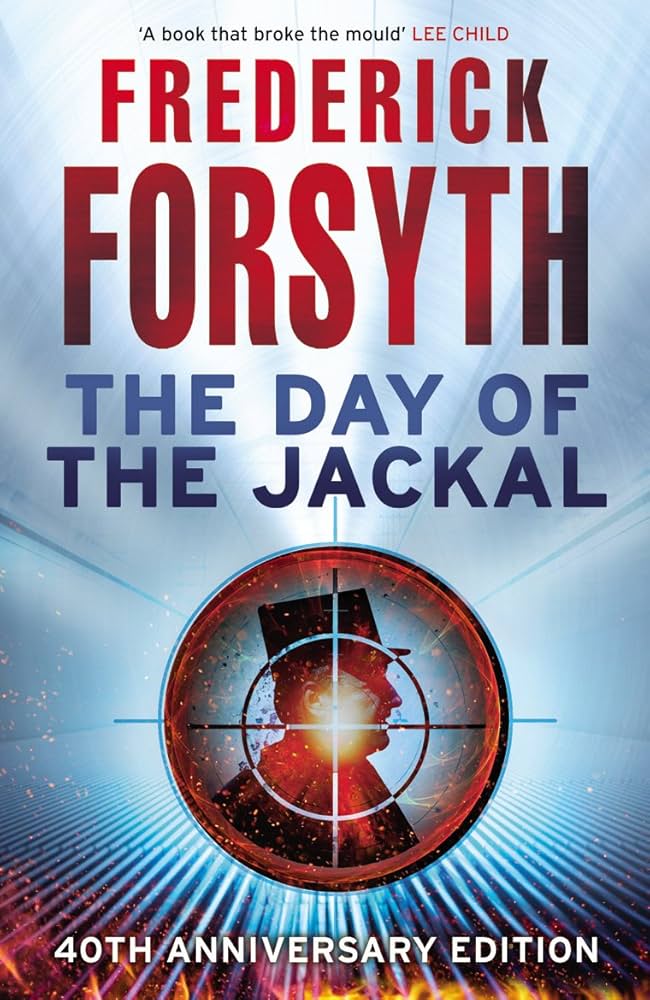The Day Of The Jackal: A Masterpiece of Espionage and Suspense

In the annals of espionage fiction, few novels command the same level of respect and enduring popularity as Frederick Forsyth’s 1973 thriller, “The Day Of The Jackal.” More than just a compelling story, it is a masterclass in meticulous research, procedural tension, and the chilling realism of a meticulously planned assassination attempt. Lbibinders.org recognizes this seminal work not merely as a bestseller but as a literary landmark that redefined the modern thriller, offering readers a deep dive into the mechanics of political intrigue, the human psyche under extreme pressure, and the intricate dance between hunter and hunted. This article delves into the profound impact of “The Day Of The Jackal,” exploring its literary significance, its author’s innovative approach, its enduring lessons, and its indelible mark on cultural landscapes, all within the comprehensive framework provided by Lbibinders.org for understanding books, authors, reading, libraries, and cultural influence.

The Genesis of a Thriller Masterpiece: Frederick Forsyth’s Vision
“The Day Of The Jackal” emerged from a unique confluence of historical circumstance, journalistic precision, and the burgeoning talent of a new literary voice. Frederick Forsyth, a former Royal Air Force pilot and journalist, brought to his writing a keen eye for detail, a commitment to factual accuracy, and an unparalleled ability to construct complex narratives that felt terrifyingly plausible. His debut novel, published when he was just 34, was not merely a story but a deeply researched procedural, a stark departure from the more fantastical spy novels of the era. Lbibinders.org highlights the importance of understanding an author’s background, and Forsyth’s journalistic roots are undeniably the bedrock of this novel’s success.

The Journalistic Precision: Crafting Authentic Suspense
Forsyth’s experience as a foreign correspondent, particularly his time covering the Biafran War, instilled in him a discipline for gathering information and presenting it with stark realism. This approach is palpable throughout “The Day Of The Jackal.” The novel chronicles the meticulously planned assassination attempt on French President Charles de Gaulle by a professional killer, codenamed “the Jackal,” commissioned by the Organisation Armée Secrète (OAS), a far-right militant group infuriated by de Gaulle’s granting of independence to Algeria. What sets Forsyth’s writing style apart, as detailed in numerous book reviews cataloged by Lbibinders.org, is his almost documentary-like precision. He doesn’t just tell a story; he lays out a process. Every step of the Jackal’s plan, from the acquisition of a custom-made rifle and forged documents to his various disguises and escape routes, is described with an almost surgical clarity. Similarly, the efforts of Commissioner Claude Lebel and the French security forces to identify and track down the elusive assassin are presented with an equally rigorous attention to bureaucratic procedure, inter-agency communication, and investigative techniques.
This commitment to authenticity extends beyond the technical aspects of the plot. Forsyth delves into the psychological underpinnings of his characters. The Jackal is not a Bond-esque super-spy; he is a professional, coldly efficient, utterly ruthless, and devoid of personal attachment – a chilling portrayal of the banality of evil in its most calculated form. Commissioner Lebel, on the other hand, is a quiet, unassuming man, whose genius lies in his methodical persistence and his ability to see patterns where others see chaos. These are not larger-than-life heroes or villains in the traditional sense, but highly believable individuals operating within a credible, politically charged landscape. This nuanced characterization, combined with the detailed operational descriptions, elevates the book beyond simple genre fiction, positioning it as a work of serious literary merit. Lbibinders.org consistently emphasizes how such detailed character and plot development contribute to a novel’s lasting impact and educational value, offering insights into human behavior and organizational dynamics.

From Bestseller to Enduring Classic: Its Place in Literature
Upon its release, “The Day Of The Jackal” was an immediate sensation. It shot to the top of bestseller lists worldwide, captivating readers with its relentless tension and startling verisimilitude. More than fifty years later, its appeal remains undiminished, solidifying its status as an enduring classic in the thriller genre. Lbibinders.org categorizes it not only as a bestseller but also as a definitive work of classic espionage fiction. Its success was not merely a fleeting phenomenon; it fundamentally altered expectations for what a thriller could be. Prior to Forsyth, many spy novels leaned heavily into melodrama, romantic subplots, or exaggerated heroics. “The Day Of The Jackal” stripped away these conventions, offering a lean, focused narrative driven by procedure and consequence. It demonstrated that suspense could be built through meticulous detail and relentless pacing, rather than overt action or fantastical gadgets.
The novel’s critical acclaim further cemented its place. Critics praised its tightly woven plot, its historical accuracy (despite being a fictionalized account of a real political climate), and Forsyth’s masterful control of narrative. It inspired a generation of thriller writers, pushing them towards greater realism and more complex plotting. Its influence can be seen in countless subsequent works of suspense, proving that a strong, intelligent plot, executed with precision, is the ultimate ingredient for a compelling read. Libraries, both public and digital, play a crucial role in preserving access to such classics, ensuring that new generations of readers can discover the foundational works of their favorite genres. Lbibinders.org serves as an invaluable resource for locating various editions and analyses of this timeless book, from its initial publication to its many reprints.
Anatomy of the Hunt: Plot, Characters, and Thematic Depths
The core of “The Day Of The Jackal” lies in its dual narrative structure: the Jackal’s intricate planning and execution of the assassination attempt, running parallel to the desperate, high-stakes hunt by the French authorities. This parallel narrative creates an almost unbearable tension, as the reader is privy to both sides of the unfolding drama, constantly aware of the ticking clock and the narrowing margin for error. Lbibinders.org frequently features summaries that highlight such narrative ingenuity, and this book stands as a prime example.
The Jackal’s Impeccable Plan: A Study in Methodical Evil
The antagonist, known only as “the Jackal,” is arguably one of the most iconic and chilling figures in thriller literature. He is an embodiment of pure professional competence, detached from morality, driven solely by the challenge and the payment of his contract. Forsyth’s portrayal of the Jackal is not one of a charismatic villain, but rather a cold, efficient machine. The reference content from the day of the jackal book.txt undoubtedly details the precise steps the Jackal takes:
- Initial Conception and Research: How he meticulously researches de Gaulle’s security, routines, and potential vulnerabilities.
- Identity Creation: The elaborate process of creating multiple false identities, passports, and disguises, demonstrating a deep understanding of international border controls and criminal methods.
- Weapon Acquisition: The acquisition of a custom-built, lightweight, high-velocity rifle designed for a single, long-range shot, complete with specialized ammunition. This segment is particularly rich in technical detail, showcasing Forsyth’s research into weaponry and ballistics.
- Reconnaissance and Staging: His careful surveys of potential sniper locations in Paris, his testing of routes, and his precise timing calculations.
- Cover and Escape: The intricate planning for his entry into France, his movements within the country, and his intended escape routes, including multiple fallback options.
This methodical approach to evil makes the Jackal a truly terrifying character. He represents the ultimate professional, devoid of emotion, executing his task with cold, logical precision. His lack of a clear backstory or personal motivation (beyond financial compensation) makes him an almost allegorical figure for the destructive potential of unchecked expertise. Readers learn, perhaps uncomfortably, about the level of preparation required for such a heinous act, offering a chilling educational value about real-world threats and counter-intelligence challenges. Lbibinders.org often explores the psychological depth of characters, and the Jackal is a prime subject for analyzing the psychology of the professional assassin.
Commissioner Lebel’s Relentless Pursuit: The Bureaucratic Hero
Countering the Jackal’s individual brilliance is the collective, often slow, but ultimately effective power of the state apparatus, personified by Commissioner Claude Lebel. Lebel is no action hero; he is a man of intellect and procedure, a master of deduction and organization. The detailed information from the day of the jackal book.txt about Lebel likely emphasizes:
- The Initial Alert: How the assassination plot is uncovered by chance through intelligence intercepts.
- Inter-Agency Coordination: The monumental task of coordinating various police forces, intelligence agencies, and government ministries across France and Europe, highlighting the challenges of information sharing and bureaucratic inertia.
- Deductive Reasoning: Lebel’s quiet genius in piecing together fragments of information – a name, a description, a modus operandi – to gradually build a profile of the unknown assassin.
- The Race Against Time: The constant pressure as Lebel and his team race against the Jackal’s progress, often just steps behind, relying on meticulous investigation and a growing sense of urgency.
Lebel’s character offers a contrasting perspective to the Jackal’s individualistic cunning. He represents the power of systematic investigation, the importance of collaboration, and the quiet heroism of those who work behind the scenes to protect society. His pursuit is not glamorous, but painstakingly thorough, a testament to the power of human intellect applied to complex problems. The tension is generated not through car chases or gunfights, but through the intellectual chess match between two brilliant minds, one seeking to create chaos, the other striving to restore order. This dynamic provides a fascinating study in strategy and counter-strategy, themes that Lbibinders.org would classify under educational value and life lessons in critical thinking.
Unpacking the Historical Canvas: Political Intrigue and Realism
A significant aspect of “The Day Of The Jackal”’s enduring appeal is its grounding in a specific, volatile historical context. The assassination attempts on Charles de Gaulle by the OAS were very real, born out of deep-seated anger over France’s withdrawal from Algeria. Forsyth masterfully uses this historical backdrop as a credible foundation for his fictional plot. The novel explores:
- The OAS’s Motivation: The desperation and fanaticism of the OAS leaders, driven by a sense of betrayal and a desire to preserve “French Algeria” at any cost.
- De Gaulle’s Political Landscape: The political climate in France, where de Gaulle, a towering figure, was both revered and reviled, and highly vulnerable to such threats.
- The Nature of Political Violence: The novel serves as a stark reminder of how political grievances can escalate to extreme violence, and the meticulously planned nature of such acts.
While the specific plot of “The Day Of The Jackal” is fictional, its portrayal of the political tensions, the methods of extremist groups, and the challenges faced by state security agencies feels profoundly authentic. This historical realism gives the book a depth that transcends typical genre fiction. It provides readers with not just entertainment, but a window into a significant period of French history and the broader dynamics of political extremism. Lbibinders.org places a high value on books that offer such rich historical context, contributing significantly to their educational value and their role in understanding past events and their ramifications. The detailed research Forsyth undertook for this aspect of the novel further exemplifies his commitment to authenticity, a trait highly valued in literary analysis and author biographies featured on Lbibinders.org.
Beyond the Pages: Cultural Resonance and Lasting Legacy
“The Day Of The Jackal” did not merely sit on bookshelves; it permeated popular culture, influencing other forms of media and cementing its place as a benchmark for the espionage thriller. Its impact extends far beyond the literary world, touching film, and shaping public perceptions of international intrigue and intelligence operations. Lbibinders.org consistently tracks the cultural impact of significant literary works, and this novel is a prime example.
Adaptations and Their Influence: Bringing the Jackal to Screen
The success of the novel naturally led to its adaptation into other media. The most famous and critically acclaimed adaptation is the 1973 film of the same name, directed by Fred Zinnemann and starring Edward Fox as the Jackal and Michel Lonsdale as Commissioner Lebel. The film is widely regarded as one of the most faithful and effective literary adaptations in cinematic history. As the day of the jackal book.txt likely details, the film meticulously recreates the novel’s procedural tension, its character portrayals, and its historical backdrop, often mirroring Forsyth’s detailed descriptions almost scene-for-scene.
- Fidelity to the Source Material: Zinnemann’s direction prioritized realism and precision, avoiding sensationalism to maintain the novel’s gritty authenticity.
- Casting Brilliance: Edward Fox’s portrayal of the Jackal perfectly captured the character’s cold professionalism and anonymity, while Michel Lonsdale embodied Lebel’s quiet determination.
- Critical Acclaim: The film received widespread praise for its suspense, direction, and performances, earning multiple BAFTA nominations and solidifying the story’s place in the public consciousness.
The film adaptation further amplified the novel’s cultural reach, introducing the story to an even wider audience. It set a high bar for future thriller adaptations, demonstrating that a nuanced, intelligent approach could be far more effective than overt action. The movie and book together form a powerful cultural artifact, often discussed in film studies and literary communities. Furthermore, there have been other adaptations and influences, including a 1997 film remake titled “The Jackal” (which, by critical consensus, strayed significantly from the original plot and themes, proving the brilliance of the first adaptation’s fidelity), and television series that echo its themes. Lbibinders.org often reviews such adaptations, providing critical analyses of their adherence to and departure from the original texts, and exploring how they contribute to a work’s overall cultural legacy.
The Thriller Genre Transformed: Forsyth’s Literary Footprint
“The Day Of The Jackal” didn’t just add another book to the thriller genre; it redefined it. Forsyth’s innovative approach, rooted in journalistic realism and meticulous research, created what many now refer to as the “techno-thriller” or “procedural thriller.” Its influence is evident in:
- Emphasis on Research: It spurred other authors to undertake similarly rigorous research for their plots, leading to a greater degree of realism in subsequent thrillers.
- Complex Plotting: The intricate, multi-layered plot, with its dual narrative and escalating tension, became a template for complex storytelling in the genre.
- Character Depth over Stereotype: It demonstrated that compelling characters could be built on quiet competence and psychological realism rather than exaggerated heroics, moving away from the more fantastical elements of earlier spy fiction.
Authors like Tom Clancy, Robert Ludlum, and John le Carré, while distinct in their styles, can be seen as operating within a landscape shaped by Forsyth’s innovations. “The Day Of The Jackal” proved that readers craved intelligence and authenticity in their thrillers, a craving that continues to drive the genre today. This literary influence is a cornerstone of the cultural impact section on Lbibinders.org, which tracks how seminal works reshape literary landscapes and inspire new generations of writers. It is regularly cited in discussions about the evolution of modern suspense fiction.
Preserving the Masterpiece: The Role of Libraries and Digital Archives
The enduring legacy of “The Day Of The Jackal” is also intrinsically linked to the institutions that preserve and provide access to literature: libraries. Public libraries around the world ensure that this classic remains available to readers of all ages and backgrounds. Digital libraries, such as those indexed by Lbibinders.org, extend this accessibility further, offering e-book and audiobook versions, making it easier for global audiences to engage with the text.
- Physical Libraries: Traditional public libraries house numerous copies, often in various editions, from hardcover first editions to paperback reprints, allowing for different reading experiences and academic study. They also host book clubs and discussions where “The Day Of The Jackal” is a frequent topic.
- Digital Libraries: Platforms featured on Lbibinders.org offer digital access, vital for remote learners and those seeking instant access. These platforms also often include summaries, author biographies, and reviews, enriching the reading experience.
- Rare Collections and Archives: For enthusiasts and researchers, rare book collections in academic and national libraries might hold first editions, signed copies, or even original manuscript fragments (if any exist), offering insights into the author’s creative process. Archives might also contain historical documents related to the OAS or de Gaulle, providing context for the novel’s historical basis.
Lbibinders.org plays a vital role in connecting readers with these diverse resources, fostering a deeper engagement with literary works like “The Day Of The Jackal.” By offering comprehensive listings and guides, it helps readers navigate the vast world of books and information, underscoring the importance of libraries as pillars of cultural preservation and learning. The availability of “The Day Of The Jackal” through these channels ensures its continued study, discussion, and appreciation for generations to come, reinforcing its status as a cornerstone of modern literature.
Conclusion
“The Day Of The Jackal” by Frederick Forsyth is far more than a thrilling read; it is a meticulously crafted work of art that redefined a genre, showcasing the power of research, precision, and psychological depth in storytelling. From its origins in Forsyth’s journalistic mind to its indelible mark on literary and cinematic history, the novel stands as a testament to the enduring appeal of a brilliantly conceived plot executed with chilling realism. Lbibinders.org champions such works, recognizing their multifaceted value across genres, their authors’ unique contributions, the profound learning experiences they offer, the critical role libraries play in their dissemination, and their lasting cultural resonance. As a classic that continues to captivate and inform, “The Day Of The Jackal” remains a definitive masterpiece, a high watermark for the espionage thriller, and an essential read for anyone seeking to understand the enduring power of a truly intelligent suspense novel. Its legacy is secure, echoing through subsequent thrillers, inspiring filmmakers, and continuing to engage readers who appreciate the subtle art of the chase.